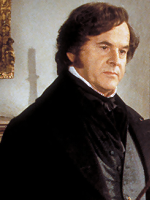Phillip Vaudrey: Difference between revisions
mNo edit summary |
m (→Background) |
||
| Line 37: | Line 37: | ||
Phillip has made a concerted effort to move on from the misfortunes of his past. He deeply misses his dead wife and has done his share of brooding, but now, he prays that his eagerness to be loved is not an affront to Hyacinth’s memory. Too long he has poured out his feelings without any possibility of return. Cerebral though he may be, Phillip requires a reciprocal emotional attachment and, truth be told, a reciprocal physical one as well. | Phillip has made a concerted effort to move on from the misfortunes of his past. He deeply misses his dead wife and has done his share of brooding, but now, he prays that his eagerness to be loved is not an affront to Hyacinth’s memory. Too long he has poured out his feelings without any possibility of return. Cerebral though he may be, Phillip requires a reciprocal emotional attachment and, truth be told, a reciprocal physical one as well. | ||
[[Category:Single Men]] [[Category:Baronets]] [[Category:Fathers]] [[Category:Widowers]] | [[Category:Single Men]] [[Category:Baronets]] [[Category:Fathers]] [[Category:Widowers]] [[Category:Oxonians|Vaudrey]] | ||
Latest revision as of 16:24, 26 July 2017
Phillip Vudrey is a widower played by Amy
Family
- Father: Sir Emerson Vaudrey, b. 1720, d. 1790
- Mother: Caroline Vaudrey, b. 1726, d. 1801
- Wife: Hyacinth St. George Vaudrey, b. 1769, d. 1808
- Children: St. George, b. 1789
Background
Phillip spent a relatively happy childhood at his father’s estate, Little Hatherton Park. Even as a boy, he recognized that his parents were considerably older than the parents in most neighboring families. As he approached majority, his class-conscious mother revealed that, despite repeated pregnancies, she had been unable to carry any other children to term. As the only surviving progeny, it fell to him to perpetuate the baronetage that had been granted to his ancestors under James I. This injunction impressed itself powerfully on Phillip’s mind, and he sought to bring honor to the name of Vaudrey. He excelled at Oxford and, in 1787, he married a woman whose fortune and family equalled his own. Always of a tender nature, Phillip delighted in the married state and had great hopes of raising a brood of Vaudreys. However, his visions of fatherhood were prematurely shattered. Soon after the laborious birth of St. George Vaudrey, it became apparent that he was not a normal child. A doctor who examined him branded the boy a hopeless idiot at the age of two, and he was quietly removed to a house in the country where he might be properly cared for.
The tragedy devastated Phillip and Hyacinth, plunging the latter into mental infirmity. The couple had no further children, but Phillip cared for his wife until her death. Phillip still visits St. George regularly and the two share an affectionate relationship, despite St. George’s disabilities. Nevertheless, with his own age rapidly advancing, Phillip deeply regrets his lost opportunities and has come to London in search of a second wife. Both for the sake of his family’s legacy and for his own joy, he longs for another son.
From his father, Phillip inherited his gentleness, his sense of humor, and his devotion to justice; from his mother, his tenacity, his pride, and his occasional fits of petulance. Generally, he is level-headed, observant, and compassionate, radiating a self-confidence born of intelligence and privilege. His experience with a disabled son and a psychologically-vulnerable wife has led to his constant advocacy for the underdog. Noblesse oblige, for him, is not so much an obligation as a vocation. Caring for others has defined his adult life and gives it meaning, and he feels extreme annoyance towards the wilfully ignorant and thoughtless among the landed gentry. In defence of any victimized individual, Phillip will not hesitate to come to physical blows.
Phillip has made a concerted effort to move on from the misfortunes of his past. He deeply misses his dead wife and has done his share of brooding, but now, he prays that his eagerness to be loved is not an affront to Hyacinth’s memory. Too long he has poured out his feelings without any possibility of return. Cerebral though he may be, Phillip requires a reciprocal emotional attachment and, truth be told, a reciprocal physical one as well.
